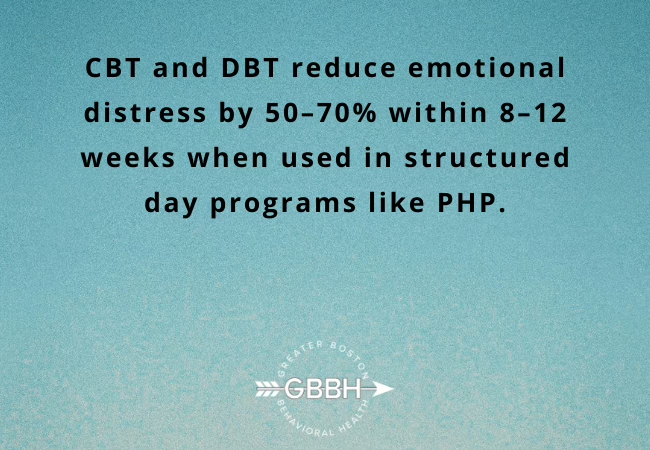Mental health recovery is not one-size-fits-all. For individuals who need more support than weekly outpatient sessions but don’t require 24/7 inpatient care, a Partial Hospitalization Program (PHP) can offer the perfect level of structure, support, and flexibility. One of the most critical components of PHP is its therapeutic framework, which blends multiple evidence-based modalities to treat a wide range of mental health conditions.
At Greater Boston Behavioral Health, therapy is at the core of our Partial Hospitalization Program in Boston. Our clinicians use a combination of approaches—most notably Cognitive Behavioral Therapy (CBT) and Dialectical Behavior Therapy (DBT)—to help individuals develop insight, regulate emotions, reduce symptoms, and build meaningful, lasting change.
In this blog, we’ll explore the essential role of therapy in PHP, what makes our therapeutic model unique, and how these interventions support recovery from conditions like anxiety, depression, trauma, mood disorders, and anger dysregulation.
What Is a Partial Hospitalization Program (PHP)?
A PHP is a highly structured, intensive treatment program designed for individuals who need significant support with their mental health but do not require 24-hour inpatient care. Clients typically attend PHP 5 days a week for 4–6 hours per day, participating in group therapy, individual counseling, psychiatric care, and life skills development.
At Greater Boston Behavioral Health, our PHP bridges the gap between inpatient and outpatient care, offering a safe space to stabilize, reflect, and grow through a diverse range of Mental Therapy Programs in Boston.
Why Therapy Is the Foundation of PHP
While psychiatric care and medication management are essential for many clients, therapy is where healing truly takes shape. In PHP, therapy is immersive and experiential—it goes far beyond talking about problems. Clients actively practice new coping strategies, explore core beliefs, and receive real-time feedback in a therapeutic community.
Our PHP integrates multiple therapeutic approaches, including:
- Cognitive Behavioral Therapy (CBT)
- Dialectical Behavior Therapy (DBT)
- Trauma-informed therapy
- Anger management therapy
- Mindfulness-based interventions
- Group process and psychoeducation
These therapies are combined to create an individualized treatment plan that meets the unique needs of every client—whether they’re managing chronic anxiety, navigating relationship issues, processing trauma, or working on emotional regulation.
Cognitive Behavioral Therapy (CBT) in PHP
Cognitive Behavioral Therapy Boston is one of the most well-established, research-backed therapies used in PHP. CBT helps individuals identify and challenge negative thought patterns that fuel emotional distress and harmful behaviors.
How CBT Works in PHP:
- Clients learn to recognize automatic thoughts and cognitive distortions
- They examine how thoughts influence emotions and behaviors
- CBT teaches structured problem-solving and healthier ways to cope
- Clients set realistic goals and track progress with therapist support
CBT is particularly effective for:
- Depression
- Generalized anxiety disorder
- Panic disorder
- Obsessive-compulsive tendencies
- Anger management issues
Within our Anger Management Therapy in Boston, CBT helps clients reduce reactivity by reframing the way they perceive triggers and develop healthier responses.
Dialectical Behavior Therapy (DBT) in PHP
Dialectical Behavior Therapy in Boston is another cornerstone of treatment at Greater Boston Behavioral Health. Originally designed to treat borderline personality disorder, DBT is now widely used to help clients with intense emotional experiences, impulsivity, and self-destructive behaviors.
Key DBT Modules Integrated into PHP:
- Mindfulness: Staying present and aware of emotions
- Emotion Regulation: Understanding and managing intense feelings
- Distress Tolerance: Navigating crises without resorting to harmful behaviors
- Interpersonal Effectiveness: Building healthy boundaries and communication skills
DBT is especially beneficial for clients experiencing:
- Mood instability (e.g., bipolar disorder)
- Self-harming behaviors
- Suicidal ideation
- Chronic interpersonal conflict
- Trauma-related dysregulation
In PHP, DBT skills are practiced daily in both group and individual sessions, reinforcing emotional control in real-world situations.
Other Therapies Offered in PHP
In addition to CBT and DBT, our Mental Health Treatment Center Boston incorporates a variety of other therapeutic techniques to support holistic healing:
Trauma-Informed Therapy
For clients with a history of abuse, neglect, loss, or complex PTSD, trauma-informed care focuses on:
- Creating safety and trust
- Reprocessing traumatic memories
- Reducing shame and hypervigilance
- Strengthening self-compassion and resilience
Mindfulness-Based Practices
These help clients:
- Ground themselves in the present moment
- Reduce anxiety and obsessive thinking
- Improve sleep and emotional awareness
Anger Management Therapy
Our Anger Management Therapy in Boston teaches clients how to:
- Recognize physiological signs of anger
- Identify underlying emotional drivers
- Use coping strategies to interrupt the anger cycle
- Communicate assertively without aggression
This therapy is essential for individuals whose anger has affected relationships, job performance, or daily functioning.
Psychoeducation
Clients learn about:
- The science of mental illness and emotional regulation
- How medications work
- The impact of lifestyle choices on mental health
- Healthy routines and boundary-setting
How Therapy in PHP Differs from Outpatient or Inpatient Therapy
| Therapy Setting | Therapeutic Intensity | Daily Engagement | Best For |
|---|---|---|---|
| Outpatient | 1x/week individual sessions | Minimal | Mild symptoms or maintenance |
| PHP | Daily group + individual therapy | 4–6 hours/day | Moderate-to-severe symptoms needing structure |
| Inpatient | 24/7 care with daily therapy | All-day supervision | Crisis stabilization and acute psychiatric needs |
PHP offers the perfect balance of flexibility and intensity, allowing clients to live at home while receiving immersive treatment.
Conditions Treated in Our PHP
Our PHP is designed to treat a wide range of mental health challenges, including:
- Anxiety disorders
- Major depression
- PTSD and trauma
- Bipolar disorder
- Personality disorders
- Self-harm and suicidal ideation (mild to moderate)
- Chronic stress and burnout
- Emotional dysregulation
- Substance use (as part of a dual diagnosis)
Clients are supported by a multidisciplinary team, including licensed therapists, psychiatrists, case managers, and support staff.

What a Typical Day Looks Like in PHP
Morning:
- Mindfulness or grounding session
- Psychoeducational group (CBT/DBT-focused)
Midday:
- Process group or skills-based group therapy
- Individual therapy session (1–2x/week)
- Psychiatric evaluation (as needed)
Afternoon:
- Trauma-focused therapy or family session
- Discharge planning, goal setting, or aftercare preparation
Clients return home each evening, allowing them to apply skills in real-life situations and return the next day to process and grow.
Why Choose Greater Boston Behavioral Health?
At Greater Boston Behavioral Health, we believe healing happens when therapy meets structure, compassion, and clinical excellence. That’s why our Partial Hospitalization Program in Boston is built on a foundation of evidence-based therapy, multidisciplinary support, and personalized care.
Here’s what makes us different:
Expert-Led Therapy You Can Trust
Our team includes licensed clinicians trained in Cognitive Behavioral Therapy Boston, Dialectical Behavior Therapy in Boston, trauma-focused care, and more. We don’t offer cookie-cutter groups—we tailor each treatment plan to your specific needs, goals, and challenges.
Comprehensive Continuum of Care
We don’t just offer PHP. From inpatient stabilization to step-down IOP and long-term outpatient therapy, we provide a seamless treatment path through all levels of care—including Inpatient Treatment Program in Boston, Residential Treatment Program in Boston, and Intensive Outpatient Program in Boston.
Integrated Psychiatric and Medical Support
Your mental health doesn’t exist in isolation. We offer Psychiatric Care in Boston, including medication management and medical coordination, as part of your comprehensive treatment plan.
Supportive, Inclusive Environment
You’ll heal in a judgment-free space that fosters dignity, diversity, and belonging. Whether you’re navigating trauma, anger, anxiety, or emotional dysregulation, our staff ensures you feel seen, heard, and supported.
Skill-Building for Real-Life Success
We don’t just help you get through the day—we help you build a life worth living. From emotion regulation and interpersonal skills to mindfulness and relapse prevention, our PHP equips you with tools that extend far beyond the therapy room.
Conclusion
If your mental health feels overwhelming, unpredictable, or hard to manage with outpatient therapy alone, you’re not out of options—you’re just ready for the next level of care.
At Greater Boston Behavioral Health, our Partial Hospitalization Program gives you access to the best of both worlds: intensive therapeutic support without full-time hospitalization. Through daily therapy, skill development, and expert psychiatric care, you’ll gain the confidence, insight, and stability you need to move forward.
Whether you’re working through trauma, struggling with emotional regulation, or seeking to reduce relapse risk, we’ll meet you where you are—and guide you toward where you want to be. Call us today at (888) 278-0716 to take the first step toward a more balanced, empowered life.
FAQ on Therapy in a Partial Hospitalization Program
What types of therapy are used in a Partial Hospitalization Program?
PHP commonly includes Cognitive Behavioral Therapy (CBT), Dialectical Behavior Therapy (DBT), trauma-informed therapy, mindfulness training, and anger management groups.
How is therapy in PHP different from outpatient therapy?
PHP provides more intensive therapy with multiple sessions per day, five days per week, while outpatient therapy typically involves one session per week.
Is PHP good for anger and emotional regulation issues?
Yes. PHP is ideal for treating anger, mood disorders, and emotional dysregulation. It combines CBT and DBT skills to help clients manage triggers and build resilience.
Do I still see a psychiatrist in PHP?
Absolutely. PHP includes regular psychiatric evaluations and medication management as part of a complete treatment plan.
Can I work or go to school while in PHP?
Since PHP is a daytime program, it may require taking time off. However, many clients transition to evening Intensive Outpatient Programs (IOP) afterward to resume their responsibilities.

